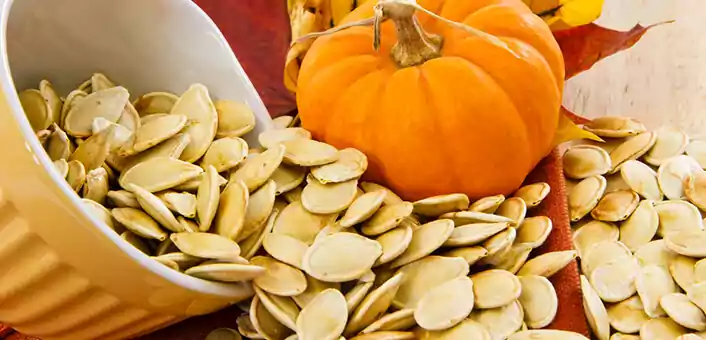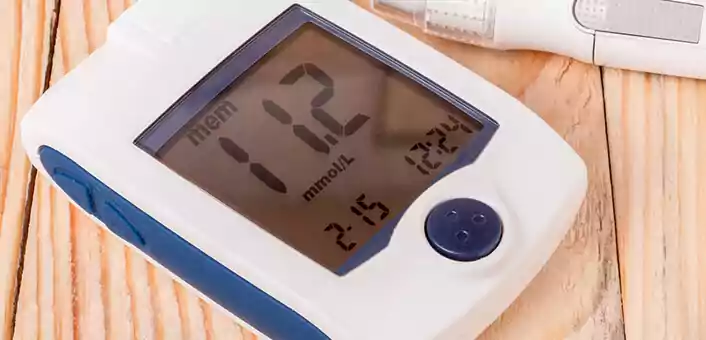
Living Well
Pumpkin Seeds: 12 Reasons Why They Are A Powerhouse In A Small Package
Dec 15, 2017The perfect snack for in-between-meals hunger cravings, to easily carry with you as your commute breakfast, or to add to your evening smoothie — pumpkin seeds are filled with nutrients. Packing in a punch of fibers and a number of antioxidants, they’re also quite filling while giving you a number of health benefits. What’s more, they are small and need no preservatives or refrigeration, so you can take them with you anywhere.
12 Health Benefits Of Pumpkin Seeds
Fight PCOS
Polycystic Ovarian Syndrome or PCOS is a disorder caused by hormonal imbalances. PCOS can lead to a number of significant changes to your body, including weight gain, increase in blood sugar, increased blood pressure, hair loss, increased male pattern hair growth (arms, legs, and face), and acne among others. PCOS can also lead to infertility.
While it is a big cause to worry, PCOS can be stopped and reversed by targeting the symptoms associated with it, and here is where pumpkin seeds come in. These amazing seeds can reduce the key symptoms associated with PCOS due to their nutrient content, antioxidant content, and phytochemicals. They help in lowering blood sugar levels, help in reducing weight, and greatly improve bone density.
The Essential Omega 3 Fatty Acids in these seeds even help in regulating hormone levels and regularize periods. They Also contain a compound called beta-sitosterol that prevents overaction of testosterone hormone (found in excess in PCOS patients.) These benefits of pumpkin seeds make them particularly effective against PCOS, making them a great food to add to your PCOS diet.
Keep Your Heart Healthy
Pumpkin seeds are full of healthy fats that are great for your heart. Omega-3 fatty acids are good cholesterols (High Density Lipoproteins) that counter the effects of bad cholesterols (Low-Density Lipoproteins.) As a result, this helps in keeping your blood vessels free from fat depositions and reduces the chances of heart attacks and strokes. Pumpkin seeds are also considered to be one of the best sources of natural magnesium, which has been shown to be beneficial in reducing the risk of heart disease and lowering blood pressure.
A study conducted on 35 postmenopausal women (above 40 years age) showed that pumpkin seeds decreased their blood pressure (diastolic) by about 7% and increased HDL content in blood by as much as 16% in just over 12 weeks. Pumpkin seeds contain high amount of dietary fibers, which are often linked with improved heart health. Another study has attributed heart health benefits to the nitric oxide enzymes in the seeds. Nitric oxide expands the diameter of blood vessels, lowering the risk of deposition in the vessels. Bottom line: Pumpkin seeds reduce the risk of heart disease- one of the biggest causes of death in India.
Lower Blood Sugar Levels
High blood sugar levels lead to diabetes, a chronic health condition fast turning into a global epidemic. India is already dubbed as the diabetes capital of the world.
Studies indicate that while pumpkin itself is beneficial in this regard, pumpkin seeds if incorporated in the daily diet, can help people with Type 2 Diabetes and pre-diabetes. This benefit of pumpkin seeds could be attributable to magnesium.
A study conducted on 1,27,000 people showed the benefits of a magnesium-rich diet. It reduced the risk of Type 2 diabetes in 33% of the male participants and in 34% of female participants, making the blood sugar lowering benefits of magnesium quite apparent. The high amounts of dietary fibers in magnesium also play an indirect but major role in reducing blood sugar level. Antioxidants and other phytochemical compounds also help in improving insulin resistance, allowing your cells to use insulin better.
Build Immunity
The high amount of antioxidants, phytochemicals, and vitamins in pumpkin seeds give a great boost to your immune system. This reduces the chances of infections like cold and flu, as well helps your body recover soon from diseases.
Aid In Weight Loss
Pumpkin seeds are nutrient dense food, as well as filled with dietary fibers. This ensures you feel full even if you eat less of these seeds without compromising on nutrient content. This makes them a must-have in your weight loss diet.
Good For Prostate and Bladder Health
A study of over 1,400 men found that eating pumpkin seeds showed marked improvement in symptoms of Benign Prostatic Hyperplagia (BPH.) BPH is a non-cancerous enlargement of the prostate gland, triggering urinary problems like urine retention. Urine retention is also associated with kidney stone formation. So pumpkin seeds can also prevent the risk of kidney stones.
Promotes Hair Growth
Pumpkin seeds contain iron and L-lysine, which promote hair growth. The beta-sitosterol in them prevents growth of hair in a male pattern (arms, legs, and face) in females. Pumpkin seeds also contain Vitamins C and E, which are antioxidants and also promote hair growth.
Increases Fertility
Pumpkin seeds are a rich source of zinc, the deficiency of which has been linked to low sperm quality and high rates of infertility in males. Also, antioxidants present in pumpkin seeds contribute to high testosterone levels along with improved overall health. All these factors together make pumpkin seeds a great food to improve male reproductive health.
In women, low levels of zinc impact the hormone cycle related to childbirth. Zinc deficiency also contributes to reduced immunity against uterine infections. These factors contribute to premature birth or even miscarriage. Pumpkin seeds with their high zinc content prevent these from happening.
Reduce Cancer Risk
A pumpkin seed rich diet has been shown to lower the risks of developing stomach, lung, and colon cancers. Pumpkin seeds have also been found to reduce the risk of breast cancer in postmenopausal women. Pumpkin seeds have also been shown to reduce the growth of prostate cancer cells.
Decrease Inflammation
Antioxidants in pumpkin seeds give them very potent anti-inflammatory properties. They can reduce fluid retention in swollen areas. The anti-inflammatory properties of these seeds also help in fighting joint inflammation in arthritis.
Improve Bone Health
High magnesium content in the body is linked with improved bone health and high bone density. It has also been tied with reduced risk of development of osteoporosis in women. Since bone density naturally starts decreasing post menopause, pumpkin seeds greatly help to counter that effect. Pumpkin seeds also reduce the risk of osteoporosis in post-menopausal women.
Help You Sleep Better
If you find it difficult to fall asleep, pumpkin seeds can help you with the ZZZ’s. They are rich in an amino acid called tryptophan. Tryptophan has been shown to improve sleep quality even if just one gram of it is consumed. Although you need to eat about 200gm of pumpkin seeds to get that one gram of tryptophan, the zinc present in the seeds greatly increases its availability to your body.
Zinc helps in convert tryptophan to serotonin, which is again converted to melatonin, the hormone responsible to maintain your biological sleep cycle. Apart from this, the magnesium present in pumpkin seeds is also linked to better sleep quality and increased time of sleep.
Nutrient Content Of Pumpkin Seeds
A single ounce (28gm) serving of pumpkin seeds contains
- Carbohydrates: 5 gm
- Fat: 13 gm
- Protein: 7 gm
- Fiber: 1.7 gm
- Vitamin K: 18% of the RDI (RDI: Required Dietary Intake)
- Phosphorous: 33% of the RDI
- Magnesium: 37% of the RDI
- Manganese: 42% of the RDI
- Zinc: 14% of the RDI
- Copper: 19% of the RDI
- Iron: 23% of the RDI
Apart from the above, pumpkin seeds also contain a number of antioxidants, riboflavin (Vitamin B2), folate, and other compounds like phytosterol.
So how many of your health goals do these nutrients and antioxidants fulfill? (Answer: From lowering heart attack risk to helping in weight loss- practically all!)
It is easy to incorporate pumpkin seeds into your diet as they are very small, dry, and do not need to be refrigerated if roasted. You can have them raw or even toss them in olive oil or bake them- they’re a versatile bunch! So introduce your palette to these almost miraculous seeds and let them work their magic on your health.
References:
https://www.medicalnewstoday.com/articles/303864.php
https://nutritiondata.self.com/facts/nut-and-seed-products/3066/2
https://onlinelibrary.wiley.com/doi/10.1002/ejlt.200390055/abstract
https://www.sciencedirect.com/science/article/pii/S0963996909000453
https://www.ncbi.nlm.nih.gov/pubmed/8638429
https://www.sciencedirect.com/science/article/pii/S0963996909000453
https://www.ncbi.nlm.nih.gov/pubmed/22591208
https://www.ncbi.nlm.nih.gov/pubmed/23859042
https://www.ncbi.nlm.nih.gov/pubmed/20098586
https://www.ncbi.nlm.nih.gov/pubmed/16856052
https://www.ncbi.nlm.nih.gov/pubmed/20826254
https://www.ncbi.nlm.nih.gov/pubmed/19828898
https://www.ncbi.nlm.nih.gov/pubmed/21545273
https://www.ncbi.nlm.nih.gov/pubmed/22082068
https://www.ncbi.nlm.nih.gov/pubmed/16758316
https://www.ncbi.nlm.nih.gov/pubmed/14693979
https://www.ncbi.nlm.nih.gov/pubmed/19335713
https://www.ncbi.nlm.nih.gov/pubmed/19285597
https://www.sciencedirect.com/science/article/pii/S2090989612000422
https://www.ncbi.nlm.nih.gov/pmc/articles/PMC4008810/
https://www.ncbi.nlm.nih.gov/pubmed/11777170
https://ods.od.nih.gov/factsheets/Magnesium-HealthProfessional/
https://www.ncbi.nlm.nih.gov/pubmed/12163983
https://www.ncbi.nlm.nih.gov/pubmed/12190640
















